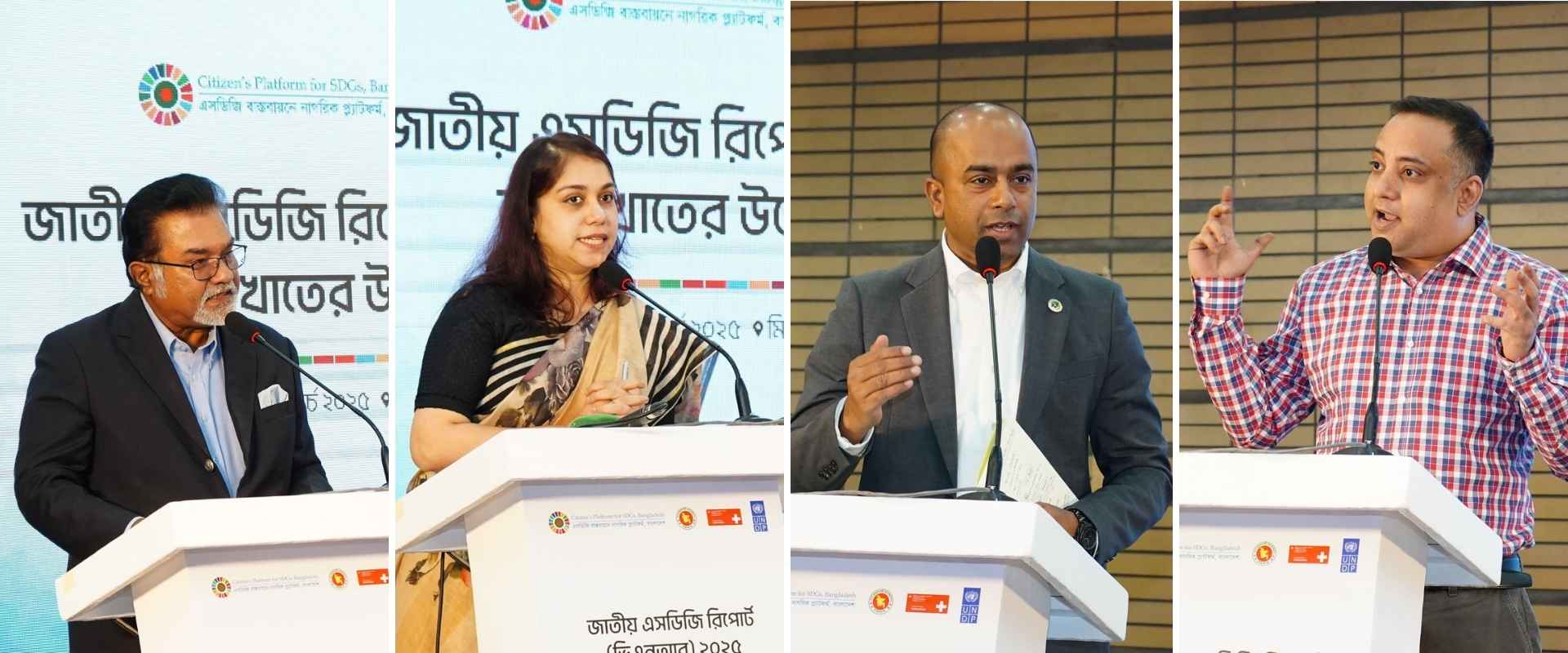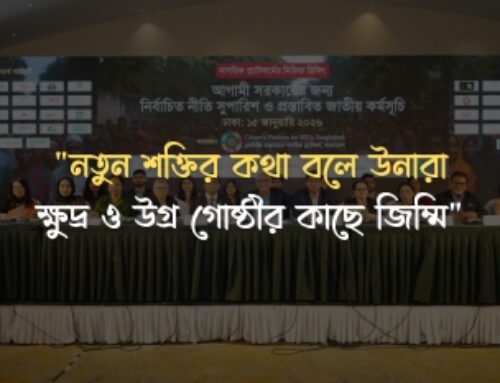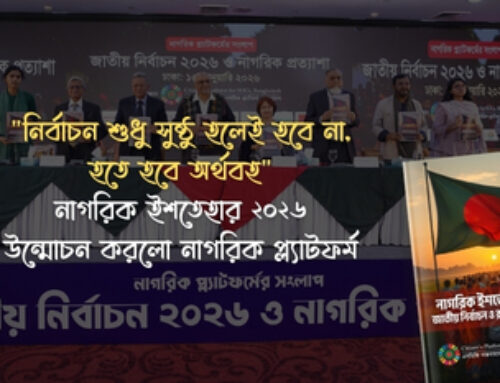
On 11 March 2025, the Citizen’s Platform for SDGs, Bangladesh; the Office of the Principal Coordinator for SDG Affairs, Chief Adviser’s Office, Government of Bangladesh; and the United Nations Development Programme (UNDP), Bangladesh, jointly hosted the ‘National SDG Report (VNR) 2025: Perspectives of Business Leaders’. The event was part of the government’s series of consultations for the preparation of the Voluntary National Review (VNR), involving diverse stakeholders. The consultation with business leaders explored the role of trade bodies and businesses in driving sustainable development and ensuring private sector contributions to the preparation of the VNR. Around 35 business leaders and young entrepreneurs attended the event.
In her welcome address, Ms Tarannum Jinan, Network Focal Point, Citizen’s Platform, thanked everyone for their participation. She highlighted that the discussion would focus on some critically important issues, such as employment generation, responsible production and consumption, corporate social responsibility, and financing to achieve the SDGs. She added that the discussion aimed to identify innovative strategies and collaborative approaches for aligning sustainable business practices with long-term national and global sustainability goals.
The consultation was moderated by Professor Mustafizur Rahman, Core Group Member, Citizen’s Platform and Distinguished Fellow, CPD. In his opening remarks, he highlighted that this VNR would assess progress, address challenges, and explore strategies for moving forward. He emphasised the critical role of the private sector in achieving the SDGs, stressing that both public and private sectors must collaborate to reach these goals. He pointed out that, among the country’s approximately ten million manufacturing units, sustainability efforts remain largely concentrated in export-oriented ready-made garments and a few prominent firms. He urged greater awareness of sustainability across other sectors, particularly SMEs.
During the ‘Panel Presentation’ session, Mr Md. Fazlul Haque, Former President of the Bangladesh Knitwear Manufacturers and Exporters Association (BKMEA) and Managing Director of Plummy Fashions Ltd. delivered a presentation on ‘Responsible Production and Consumption’. In his address, he emphasised that Bangladesh is home to many green factories, although these factories often fail to receive the recognition and publicity they deserve. Referring to incidents such as the Rana Plaza and Tazrin Fashion tragedies, he noted that such events have tarnished the reputation of Bangladesh on the global stage. He further observed that while funds are available to make businesses more environmentally friendly, the criteria for accessing these funds are often unrealistic. He recommended promoting green-certified businesses in the global market and suggested fostering global partnerships to ensure responsible consumption and production.
Ms Shahamin Zaman, Executive Director of Global Compact Network Bangladesh, spoke on the issue of ‘Corporate Social Responsibility’ (CSR). She highlighted the importance of localising the SDGs and incorporating small and medium enterprises (SMEs) in the achievement of these goals. While acknowledging that the SDGs present a comprehensive framework, she pointed out the lack of effective policy implementation. Ms Zaman recommended institutionalising CSR funds and directing these funds towards thematic areas of investment. She advocated for green banking and the upgrading of SMEs to meet global standards. Additionally, she noted that CSR funding often goes unrecognised and called for better mapping and peer learning. She also stressed the necessity of providing tax relief for companies that utilise CSR funds effectively.
The presentation on ‘Financing to Achieve the SDGs’ was delivered by Mr Asif Ibrahim, Core Group Member, Citizen’s Platform and Vice-Chairman, NewAge Group of Industries. He underscored the importance of raising awareness about the role of the private sector in financing and achieving the SDGs. Mr Ibrahim highlighted the need for impactful investments in green initiatives, such as solar panels, and discussed the need for micro-financing to improve access to capital. He also advocated for creating inclusive workplaces, particularly for women and people with disabilities. Furthermore, he called for the quantification of progress and the removal of bureaucratic obstacles to facilitate these efforts.
During the ‘Open Floor Discussion’ session, several key issues were raised concerning the business environment in Bangladesh. Barriers to foreign investment were highlighted, particularly the negative image of the country, which hinders foreign investment. It was noted that although companies often have rules in place, they frequently fail to implement them effectively, which undermines credibility and trust.

The discussion also emphasised the importance of policy support and innovation for driving business growth. There was a strong call for fostering innovation in business practices, coupled with supportive policies to create an environment conducive to business development and competitiveness.
The impact of political stability and the Least Developed Country (LDC) graduation on business operations was another point of concern. Participants noted that political instability poses a significant challenge to long-term business success. Additionally, the upcoming graduation of Bangladesh from LDC status was discussed, with a focus on the need for capacity building and the scaling up of businesses to meet new economic challenges.
A key issue addressed was CSR and taxation, with the observation that companies investing in social causes do not receive tax exemptions, despite their contributions to the community and the economy. This highlighted the need for a policy shift to encourage CSR.
Further, there was a focus on technology and human resources, with an emphasis on the necessity of updating human resources to align with industry standards and the fast-evolving technological landscape. Participants also stressed the importance of investing in emerging technologies, such as artificial intelligence and robotics, to remain competitive.
In terms of support for SMEs and financial instruments, discussions centred on the promotion of small and medium enterprises (SMEs) as a key driver of economic development. Attendees called for the provision of soft loans to support the growth of these businesses, alongside the importance of crop insurance to safeguard the agricultural sector. The need to improve public procurement processes to support local businesses was also highlighted.
The value of industry-academia collaboration was recognised as crucial for fostering innovation and addressing the skills gap within the workforce. Such collaboration was seen as essential for improving workforce capabilities and aligning education with industry needs.
Another significant concern was the safety of informal sector workers, with participants urging greater attention to the welfare of this segment of the workforce. The need for skill-based training to bridge existing gaps and better prepare the workforce for future challenges was also emphasised.
Additionally, there was a strong call for digitalisation and consumer feedback to enhance business operations and streamline processes. Gathering consumer feedback was highlighted as an important strategy to improve products, services, and overall business practices.
Finally, the discussion touched upon the importance of inclusive growth and the legal framework. Ensuring the inclusion of marginalised groups in economic growth and development initiatives was identified as essential for sustainable progress. Participants also stressed the need for a robust legal framework to support these initiatives and ensure fair, transparent, and sustainable business practices.
The open floor discussion was followed by a ‘Special Reflections and Closure’ session. Mr Shihab Quader, Director General (SDG Affairs), Chief Adviser’s Office, Government of Bangladesh, mentioned that the government aims to ensure transparency in the VNR process and to inform policies through such discussions. Mr Quader commended the resilience of Bangladesh’s business leaders and expressed hope that their challenges would be adequately represented in this VNR. He pointed out that previous VNRs had identified access to finance, the lack of incentives for adopting sustainable business models, and policy alignment issues between the government and the private sector as the primary challenges. He raised questions about whether these challenges persist and what significant changes have occurred since the previous reviews. He also referenced
the IT sector as a potential growth area, although he observed that many unnecessary projects had been undertaken over the years. He further noted that the interim government is focusing on carbon trading frameworks, human resource development, and sustainability bonds as part of its forward-looking agenda.
Mr Anowarul Haq, Assistant Resident Representative of UNDP Bangladesh, highlighted that there is a lack of awareness regarding the connection between the private sector and the SDGs, as well as how the private sector contributes to achieving these goals. He pointed out that the development budget alone is insufficient to meet the SDGs and that both the state and the business community play equally crucial roles in this endeavour. Furthermore, he noted that while the discussions addressed several key issues, it is important to reassess core business models. Both the government and the private sector face challenges in engaging socio-economically vulnerable communities, but he emphasised that the private sector has the greatest potential for delivering sustainable solutions. Mr Haq also stressed that to scale impactful ideas, investment is needed, alongside a suitable legal framework and a platform for sharing achievements and insights.
Dr Debapriya Bhattacharya, Convenor, Citizen’s Platform and Distinguished Fellow, CPD, remarked that the concept of sustainability has evolved over the years, largely due to the private sector’s contributions. However, he noted that these efforts often go unrecognised. He argued that adopting a sustainable business model without a conducive business environment would be contradictory and emphasised the need to improve Bangladesh’s investment climate, with greater government support. He also highlighted the importance of ethical leadership and called for institutionalised monitoring and evaluation at the policy level to ensure transparency and assess progress in sustainability.
On CSR and policy implementation, he advocated for a more structured approach to CSR funding and proposed tax incentives to encourage corporate contributions, while cautioning against tax evasion. Dr Bhattacharya also noted that policymakers often lack awareness of CSR and sustainable economics, urging the need for training. In conclusion, he stated that effective public-private collaboration and strong leadership are crucial for building a sustainable economy in Bangladesh.





Leave A Comment